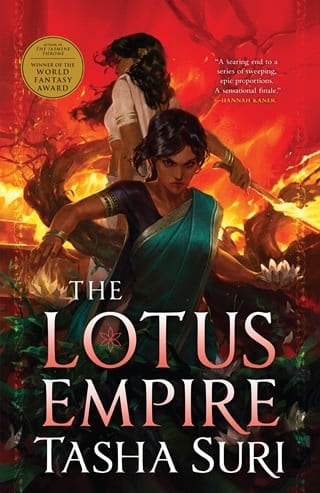Chapter 28 Varsha
VARSHA
Vijay loved sunlight. At night he was fretful, weeping and weeping, his cries insistent enough that Varsha could only weep with him. It was only when her maid Parul suggested lighting oil lamps—enough to brighten the room and draw every flying insect to its walls—that he quieted.
So Varsha began to make a point of carrying him around the mahal, to every single veranda or rooftop or garden that she could find. She had never moved freely during Chandra’s reign—she had been far too frightened to risk angering him—but the empress had told her she could go where she wished within the mahal. She’d told Varsha she was part of the imperial court.
Well, then. Varsha would test that.
She found that one of Vijay’s favorite places was the garden of the imperial temple. Here, the light was soft—turned gentle and shadow-touched by the high walls of the temple and the low, wide-branched trees that seemed to be constantly fragrant and flowering.
She was in the gardens, seated on a bench beneath a tree, when a priest approached her.
“Lady Varsha,” he said. He leaned forward, gazing down at her son. His eyes crinkled in the corners as he smiled. “He is a fine boy, my lady. A true scion of his father’s line.”
He did not say He looks like his father . But she wondered if that was his intent. Her stomach curdled. She had looked at Vijay again and again and searched for his father in his face. He had her brother’s nose, and her father’s ears; her mother’s eyelashes and her own mouth. He was heir to Parijatdvipa, to be sure, but he was a Saketan child through and through. Or so she had convinced herself. Perhaps she was wrong.
“Thank you, priest,” she said, and lowered her eyes.
He sat down beside her. “May I bless him, my lady?” he asked. “Simply a mantra for his good health.”
“Of course.” What else could she say?
“If your maid could give us privacy,” he said cordially. Varsha raised her eyes to meet her maid’s. Parul, gray with terror, nodded and bowed—and stepped away.
The priest touched his fingertips to her sleeping son’s forehead and began to murmur a mantra. She held her son and listened to the cadence of the prayer, waiting for it to end.
“The empress will die, Lady Varsha,” the priest said. His tone, his cadence, did not alter. He could still have been praying. “She will burn, as the mothers demand she must. She will see, one day, that she must rise to the pyre. She cannot be an ally to you. For your son’s sake, you must ally with us. Trust in the priesthood, Lady Varsha, so that you may raise your son to glorious rule.”
She could not look at him. Her maid was not far, and her son was beginning to stir.
“Return here tomorrow,” he said, rising to his feet. “And we will talk, you and I.”
That night, in the lamplight, she rocked her son and pondered her choices.
The priest claimed the empress would die. If he said so, perhaps it was true. And in her absence, her son would be under a new power: the priesthood.
They would not be kind to Varsha if she stood against them.
They are all the same , she thought bitterly. Those who wield power. And not for the first time she hungered for what she did not have. Power of her own.
She met him the next day. Bowed her head, worshipful. She knew how to play at subservience.
“Priest,” she said. “Tell me what I must do.”
He smiled at her, a kind, gentle smile.
“My name is Mitul, Lady Varsha,” he said. “And all the High Priest asks of you, my lady, is information.”
 Fullepub
Fullepub 



